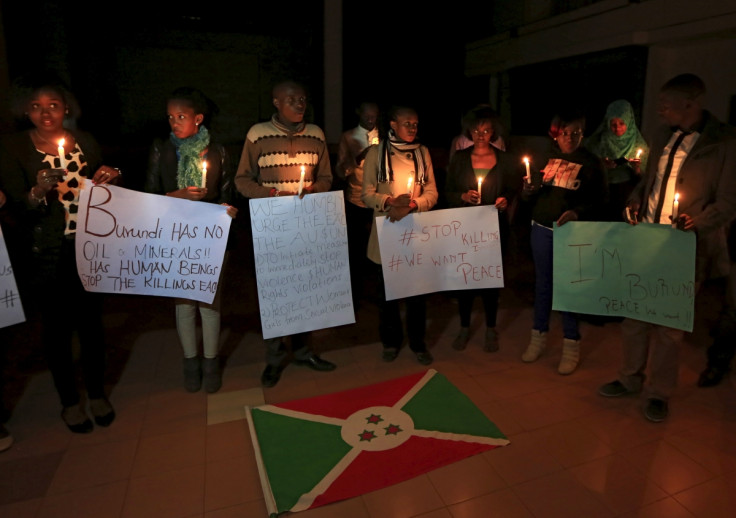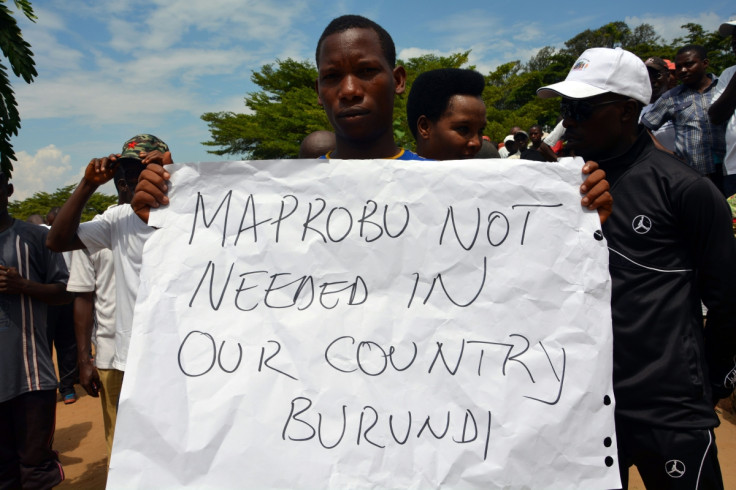Burundi peace talks: What can Burundians expect from negotiations?

Talks aimed at a settlement to Burundi's deadly political divide between President Pierre Nkurunziza's embattled government and the opposition were supposed to start in Arusha, Tanzania on Wednesday 6 January, but the government announced it would not take part.
Nkurunziza, a former rebel turned president, announced in April that he would run for a controversial third term, in a move many commentators say breached the 2005 Arusha peace deal that ended the 12-year civil war, which claimed 300,000 lives, and prompted weeks of demonstrations by young activists in the capital Bujumbura.
Eight months down the line, pressure is mounting on both sides to reach a peace deal. The United Nations Security Council (UNSC) warned of sanctions, before the African Union (AU) said it was considering an unprecedented plan to send 5,000 troops from the East Africa Standby force to protect civilians in the strife-torn nation.
In this volatile environment, IBTimes UK looks at what Burundians could expect from this round of negotiations.
When will the government attend?
At the end of December, the defiant government rejected the proposed date of 6 January to resume the talks aimed at ending the deadly violence in the nation, instead whispering it could wait until the 16 January to re-open the debate.
On 5 January, Joseph Bangurambona, the permanent secretary in Burundi's foreign affairs ministry, confirmed it was pulling out, adding no agreement had been reached on a date. "No dialogue tomorrow, neither on January 16 as many may think, because there has been no consensus on that date," Bangurambona told the Reuters news agency.
Following the last round of talks hosted by Uganda's President Yoweri Museveni, the regional mediator to drive the peace efforts for the East African Community (EAC), however, the AU threatened unspecified sanctions should any of the sides fail to turn up in Arusha.
On Tuesday 5 January, a source close to the talks told IBTimes UK there was still "no logistics such as plan, tickets or invitations for the participants", hinting "confirmation of the holding of the negotiations remains doubtful".
Interference in internal affairs?
Nkurunziza's government previously accused the AU − which demands an Africa-led solution − of interfering in state sovereignty, after the ruling party said it would not open dialogue with members of the opposition it suspects of involvement in a failed coup attempt that aimed to stop Nkurunziza's third-term bid in May 2015.
While a political solution is not beyond the bounds of possibility, it is still difficult to see how the parties involved could rapidly find common ground.
The opposition alliance National Council for the Restoration of Arusha Agreement and Rule of Law (CNARED), which is expected to sit at the negotiating table, wants the president to step down − something commentators believe the government will not agree to.
At the last meeting on 28 December, Bujumbura rejected Museveni's demands for an amnesty for members of the CNARED, a group the president has branded as a "terrorist organisation".
"If the people we have evidence against [for] participating in the coup show up in the [negotiating] room, we get out. It's as simple as that," Alain Aimé Nyamitwe, the nation's foreign minister and head of the government delegation, told media during the last round of talks in Uganda.
At the end of those discussions, Museveni took a hard-line stance with the government, telling reporters: "There is a problem in Burundi but due to sovereignty, we can't go in. Sovereignty [only comes] when you're protecting wrongs. You are not sovereign against the Europeans who come to tell you to do this or that. You are sovereign against your own brothers who want to help."
Peacekeepers to protect civilians?

On 17 December, the AU invoked for the first time the Article 4 (h) of the AU's Constitutive Act, allowing it to intervene in a member state without its permission "in respect of grave circumstances, namely: war crimes, genocide and crimes against humanity".
The government consequently rejected the AU's plans to deploy the African Prevention and Protection Mission in Burundi (MAPROBU, as it is to be called) for six months, threatening to attack the force should it deploy.
Speaking on state television, Nkurunziza said: "Everyone has to respect Burundi borders. In case they violate those principles, they will have attacked the country and every Burundian will stand up and fight against them. The country will have been attacked and it will respond."
On 26 December, thousands of Nkurunziza supporters took to the streets of Bujumbura to protest against the AU's plan to deploy peacekeepers. The demonstrations were led by Vice President Gaston Sindimwo, who insisted that the nation's army is capable of halting violence and protecting all Burundians.
Carina Tertsakian, Human Rights Watch (HRW) senior researcher on Burundi, told IBTimes UK on Tuesday 5 January the government's initial reaction "has not been encouraging". "Not only in these particular talks but even more generally over the last few months, the government has tended to either reject or ignore many of these recommendations − whether from the AU, the UN, other governments and facilitators."
Tertsakian added: "That has been disappointing, but the talks are at least some kind of forum, an environment for these issues to be aired and we would encourage the facilitators involved in the talks not to give up in the face of that apparent hostility on the part of the Burundian government, but to try and find ways to prevent a further deterioration."
Protection from rights abuses?
At least 400 people have been killed and almost 3,500 have been arrested in a campaign of political repression and violent unrest, prompting Zeid Ra'ad Al Hussein, the United Nations (UN) high commissioner for human rights, to declare that the country was on the verge of civil war.
Tertsakian urged all those involved to make sure that the human rights crisis in Burundi are at the centre of these talks, "and that whatever is discussed or agreed on prioritises measures to end the killings and other very serious abuses that have been going on". Many of these abuses have targeted suspected government opponents or young men living in so-called opposition neighbourhoods.
The researcher insisted one of the primary and most important responsibilities of the government was "to ensure that its own security forces don't commit crimes or human rights abuses against their citizens they are supposed to protect".
She said: "Unfortunately, in Burundi, it's been the opposite: not only have the security forces been carrying out extra-judicial killings, arbitrary arrests, torture and other abuses, but they have also been allowed to get away with that. There is almost total impunity for those abuses."
Losing faith in peace talks?
Young people in exile in neighbouring countries have told IBTimes UK how they find it hard to see how the talks can bring change, claiming the negotiations are "a play, a mascarade".
Speaking from Rwanda's capital Kigali under condition of anonymity, a young man in his twenties described how he distrusted the parties involved in the talks, which he felt failed to represent him.
"These people negotiating on our behalf are all of the old guard. Many of them were involved in the civil war and many have committed crimes during that time," he said, highlighting that a number of political parties came out of former rebel or armed groups fighting in the 1993-2005 war.
"[Burundi] is just wasting time with these talks and, while we want peace, we want to feel we can be represented by people we trust to do the right thing for Burundi's future," he said.
© Copyright IBTimes 2025. All rights reserved.






















